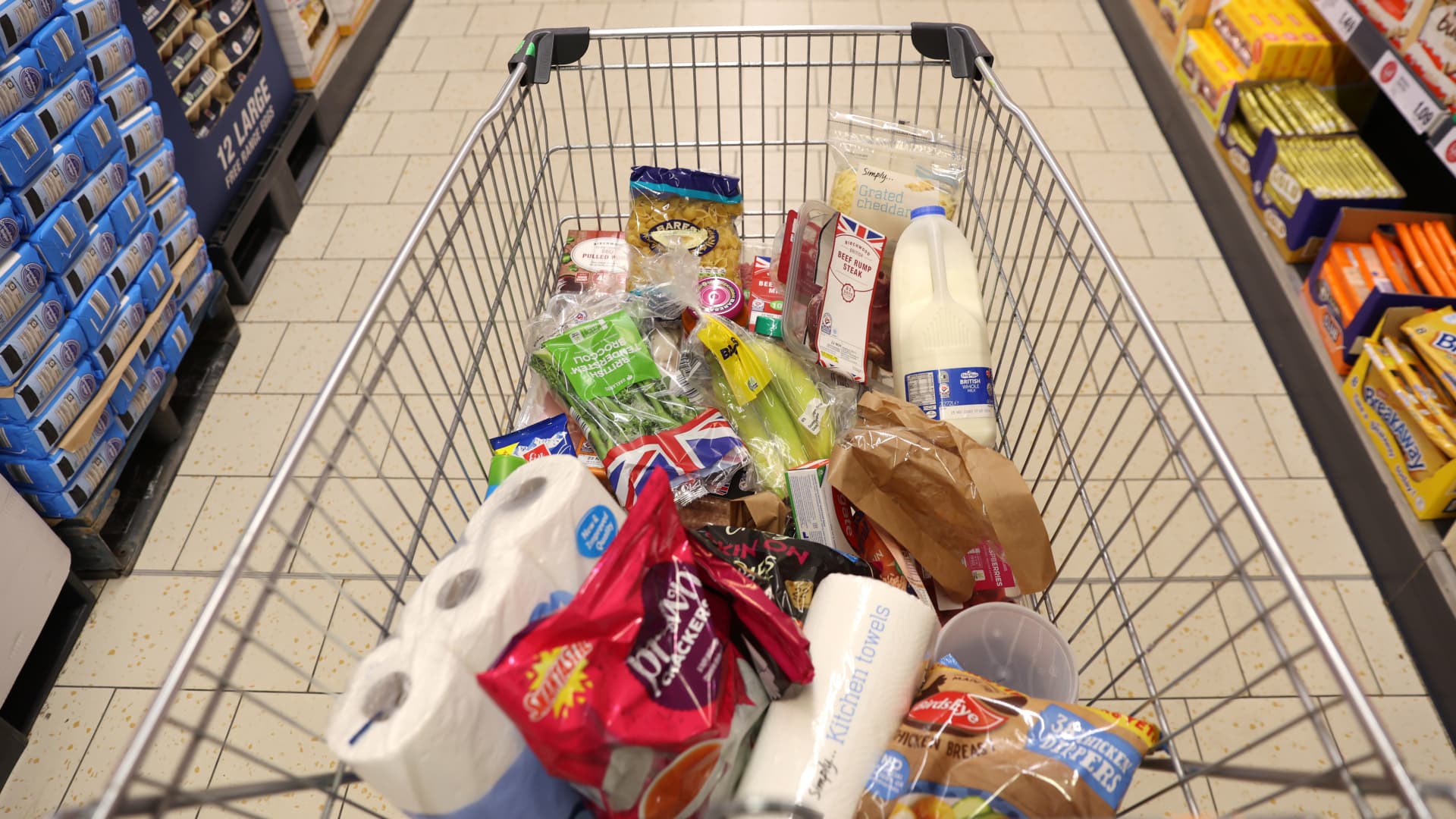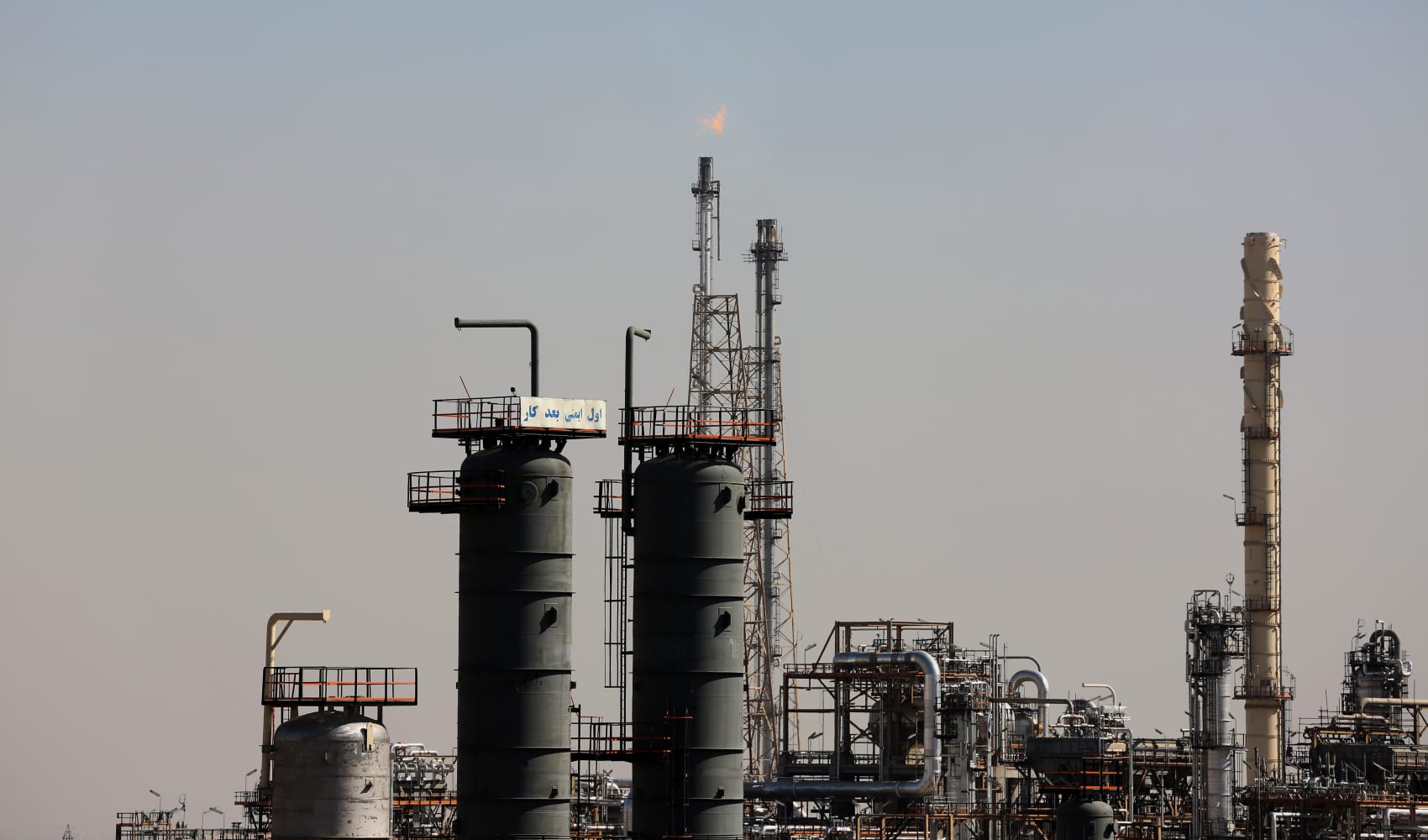
This is CNBC's live blog covering European markets.
European markets slid further Tuesday despite euro zone growth figures coming in ahead of estimates.
The pan-European Stoxx 600 index closed down 0.2%, with the majority of sectors and all major indexes ending in the red. For the month of January, the index saw a gain of 6.72%
Basic resources stocks were the worst performing of the day, closing down 1.2%, while the food and beverage sector ended 0.9% higher. Banking stocks closed up 0.6% after UniCredit and UBS results beat estimates.
Get Connecticut local news, weather forecasts and entertainment stories to your inbox. Sign up for NBC Connecticut newsletters.
Data published in the morning showed the euro zone economy grew 0.1% in the last quarter of 2022. That was better than analyst estimates of a 0.1% contraction; though still represents a slowdown from 0.3% growth in the third quarter.
Separate data published Tuesday showed a surprise fall in German retail sales for December, painting a mixed mixture ahead of the European Central Bank's interest rate hike decision on Thursday. Markets have priced in 50 basis point hikes at this and its next meeting, but there is uncertainty over its next moves.
Markets also have an eye on the Federal Reserve's monetary policy decision Wednesday. Traders widely expect a 25 basis point increase, but will monitor commentary for clues about how much further the Fed intends to hike, or when it plans to cut rates.
Money Report
In Asia, markets were mostly lower, while U.S. stock futures fell Tuesday.
Stocks on the move: Unicredit up 11%, Philips down 5.8%
UniCredit continued to trade higher in afternoon deals, rising 11% following a bumper profits report Tuesday.
On the other end, German arms manufacturer Rheinmetall fell to the bottom of the benchmark, down 6.4%, and Philips sunk 5.8% on news that it is to cut its workforce by 13%.
— Karen Gilchrist
U.S. stocks open higher
U.S. stocks opened marginally higher Tuesday as traders wrapped up a strong month for equities.
The Dow Jones Industrial Average was trading flat in early deals, while the S&P 500 was 0.1% higher. The Nasdaq was also up 0.2%.
— Karen Gilchrist
Euro zone economy posts surprise expansion in the fourth quarter, curbing recession fears
The euro zone grew 0.1% in the last quarter of 2022, according to preliminary Eurostat data released Tuesday.
Energy prices cooled off in the latter part of the year, bringing some relief to the euro zone's broader economic performance.
The latest figures come after the euro area posted a 0.3% GDP increase for the third quarter.
Germany surprised to the downside at a country breakdown level. The biggest European economy contracted by 0.2% in the last quarter of 2022, with analysts now expecting Berlin will head into a recession.
— Silvia Amaro
UK grocery price inflation hits a record 16.7%
U.K. grocery price inflation hit a record 16.7% in the four weeks to January 22, an increase of 2.3% on the previous month, market research firm Kantar said Tuesday.
The figure, the highest since the company started tracking data in 2008, marks a further exacerbating of the country's cost-of-living crisis, which has seen shoppers trade in branded food products for own-brand labels and discount retailers.

"We thought inflation was coming down; the fact it's gone back up isn't great news," Fraser McKevitt, head of retail and consumer insight at Kantar, told CNBC. Grocers have been "boosting their own-label ranges especially, with sales of these lines growing consistently over the past nine months."
Own-label lines grew by 9.3% over the period, while discount retailers Aldi became the fastest growing grocer for the fourth month in a row, just ahead of Lidl.
— Karen Gilchrist
Recession in Europe and U.S. still very possible, portfolio manager says
Data published Tuesday showed economic growth in France slowed from 0.2% to 0.1% in the fourth quarter, while retail sales in Germany unexpectedly fell in December.
Joost van Leenders, senior portfolio manager at Kempen Capital Management, told CNBC these and other indicators meant the picture going into 2023 was "not that strong" and the possibility of recession in Europe and the U.S. was "still firmly on the agenda."
— Jenni Reid
Stocks on the move: UniCredit up 7.5%, Rheinmetall down 6%
UniCredit was the top performer in early trade, rising 7.5% after the bank promised to dish out 5.25 billion euros ($5.69 billion) to shareholders following bumper profits.
German arms manufacturer Rheinmetall dropped 6% despite yesterday announcing it had won a U.S. Army contract, alongside General Motors, to supply up to 40,000 trucks valued at up to $14 billion.
— Jenni Reid
European markets open lower with eyes on GDP data, central bank meetings
Europe's Stoxx 600 index opened 0.2% lower, extending Monday's slide as investors prepared to chew over a euro zone GDP flash estimate.
Figures published early Tuesday from France, the bloc's second-largest economy, showed growth slowed from 0.2% to 0.1% in the fourth quarter of 2022. That was nonetheless ahead of expectations.
Most sectors were in the red in early trade, led by financial services, down 0.8%.
However, banks gained 0.6% after UniCredit and UBS beat profit expectations.
Also dominating markets this week are central bank rate hike decisions due from the U.S. Wednesday and from the U.K. and eurozone Thursday.
— Jenni Reid
UniCredit hikes payout goal by 40% after record profit
UniCredit pledged on Tuesday to return 5.25 billion euros ($5.69 billion) to investors after posting its best profit in over a decade.
The bank said net profit came in at 2.46 billion euros in the three months through December, more than twice an average forecast of 1.10 billion euros ($1.2 bln) from analysts polled by the bank.
UniCredit said it expected to post a net profit in 2023 broadly in line with 2022 including its Russian business, after it had excluded this from its profit goal last year following Russia's invasion of Ukraine.
It has failed to extricate itself from Russia where it owns a top 15 lender.
— Reuters
Swiss bank UBS gets a boost from higher interest rates, beats expectations in fourth quarter
UBS' fourth-quarter profit beat market expectations, but the Swiss banking giant reported a fall in revenues on the back of weaker client activity and warned of an "uncertain" year ahead.
The bank reported $1.7 billion of net income for the fourth quarter of last year, bringing its full-year profit to $7.6 billion in 2022.
Looking ahead, the Swiss lender said that revenues for the first quarter of 2023 were set to be "positively influenced" by higher client activity and interest rates, as well as by the easing of Covid-19 restrictions in Asia.
However, it was cautious about the economic outlook more broadly, citing central bank activity as a potential catalyst for market volatility.
UBS said it will be purchasing more of its own shares this year.
— Silvia Amaro
European markets: Here are the opening calls
European markets are heading for a lower open Tuesday as investors focus on the next U.S. Federal Reserve meeting, which begins today. The two-day meeting will conclude Wednesday with an announcement of the central bank's latest interest rate decision.
The U.K.'s FTSE 100 index is expected to open 26 points lower at 7,758, Germany's DAX 79 points lower at 15,052, France's CAC down 40 points at 7,049 and Italy's FTSE MIB down 125 points at 26,260, according to data from IG.
Earnings come from Pets at Home, UBS and Spotify, and data releases include fourth-quarter euro zone gross domestic product data. Preliminary German and French inflation data for January is also due to be released.
— Holly Ellyatt
CNBC Pro: What one tech fund manager is expecting from Apple and Alphabet earnings this week
Microsoft issued a disappointing revenue forecast last week, but its stock has since increased. What does that mean for the other Big Tech companies set to report earnings?
Tech fund manager Jeremy Gleeson, who manages the £1.1 billion ($1.5 billion) AXA Framlington Global Technology Fund, said there was enough bad news in Microsoft's earnings to "spook" investors into selling the stock.
However, the fact that the stock is up by more than 2% subsequently is an "encouraging" sign for the rest of Big Tech's earnings, Gleeson told CNBC's "Squawk Box Europe".
He shared his thoughts on what to expect from Apple and Alphabet this week.
CNBC Pro subscribers can read more here.
— Ganesh Rao
CNBC Pro: Tesla shares rose 30% last week. Here’s where Wall Street sees it going next
Just last week, the electric-vehicle maker's stock leaped by more than 30% following its earnings announcement. This year so far, Tesla shares are up by around 44%.
It follows a bleak 2022 when Tesla shares slumped over 35% in December and around 65% over the year.
After all this volatility, here's where Wall Street analysts see the stock going next:
CNBC Pro subscribers can read more here.
— Weizhen Tan
CNBC Pro: Can Chinese stocks rally further? One investment bank thinks so — and names its top stock picks
The recovery in Chinese stocks gained steam on Monday, as China's benchmark index came within striking distance of a bull market.
Bernstein's analysts believe the rally has further to go and reveal their top stocks to play it.
Pro subscribers can read more here.
— Zavier Ong






